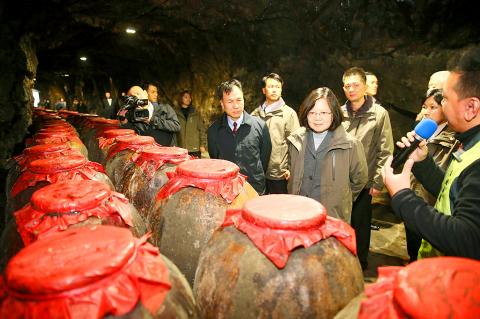The Chinese Nationalist Party (KMT) yesterday criticized amendments to the Labor Standards Act (勞動基準法), which were enacted last month, saying they had caused prices of most consumer goods to increase and forced shops and businesses to close during the Lunar New Year holiday.
KMT Culture and Communications Committee deputy director Hung Meng-kai (洪孟楷) said there has been much inconvenience and disruption in people’s lives since the amendments introduced the “one fixed day off and one flexible rest day” rule to enforce a 40-hour workweek policy and scrapped seven national holidays.
Hung said the new policy has made a mess of things, with most people demanding that the government review it and make adjustments.

Photo: CNA
“We urge Premier Lin Chuan (林全) and President Tsai Ing-wen (蔡英文) to reflect during the Lunar New Year holiday on how to improve this policy,” Hung said at a KMT news conference.
He cited as example funeral parlors in Pingtung City that had to shut down for five days for the holiday, as well as forcing the catering companies who supply food for worship and display at funeral services to close.
“How can a government policy affect funeral service providers? The implementation of ‘one fixed day off and one flexible rest day’ for workers has led to this result. It is rubbing salt in the wound for families with a deceased member in need of a proper funeral,” he said.
He received reports of shops and services having to shut down over the weekend, Hung said, adding that some companies had to cancel annual employee health check-ups and can no longer provide subsidies for overseas holidays because of the changes to the labor law.
“In a recent survey, more than 70 percent of respondents said they are experiencing pressure from rising prices in most consumer goods, and about 65 percent of people felt their lives were being inconvenienced by the new policy,” Hung said.
The policy has been in effect for more than a month, but most people still cannot adapt to the changes, he said.

An essay competition jointly organized by a local writing society and a publisher affiliated with the Chinese Communist Party (CCP) might have contravened the Act Governing Relations Between the People of the Taiwan Area and the Mainland Area (臺灣地區與大陸地區人民關係條例), the Mainland Affairs Council (MAC) said on Thursday. “In this case, the partner organization is clearly an agency under the CCP’s Fujian Provincial Committee,” MAC Deputy Minister and spokesperson Liang Wen-chieh (梁文傑) said at a news briefing in Taipei. “It also involves bringing Taiwanese students to China with all-expenses-paid arrangements to attend award ceremonies and camps,” Liang said. Those two “characteristics” are typically sufficient

A magnitude 5.9 earthquake that struck about 33km off the coast of Hualien City was the "main shock" in a series of quakes in the area, with aftershocks expected over the next three days, the Central Weather Administration (CWA) said yesterday. Prior to the magnitude 5.9 quake shaking most of Taiwan at 6:53pm yesterday, six other earthquakes stronger than a magnitude of 4, starting with a magnitude 5.5 quake at 6:09pm, occurred in the area. CWA Seismological Center Director Wu Chien-fu (吳健富) confirmed that the quakes were all part of the same series and that the magnitude 5.5 temblor was

The brilliant blue waters, thick foliage and bucolic atmosphere on this seemingly idyllic archipelago deep in the Pacific Ocean belie the key role it now plays in a titanic geopolitical struggle. Palau is again on the front line as China, and the US and its allies prepare their forces in an intensifying contest for control over the Asia-Pacific region. The democratic nation of just 17,000 people hosts US-controlled airstrips and soon-to-be-completed radar installations that the US military describes as “critical” to monitoring vast swathes of water and airspace. It is also a key piece of the second island chain, a string of

The Central Weather Administration has issued a heat alert for southeastern Taiwan, warning of temperatures as high as 36°C today, while alerting some coastal areas of strong winds later in the day. Kaohsiung’s Neimen District (內門) and Pingtung County’s Neipu Township (內埔) are under an orange heat alert, which warns of temperatures as high as 36°C for three consecutive days, the CWA said, citing southwest winds. The heat would also extend to Tainan’s Nansi (楠西) and Yujing (玉井) districts, as well as Pingtung’s Gaoshu (高樹), Yanpu (鹽埔) and Majia (瑪家) townships, it said, forecasting highs of up to 36°C in those areas